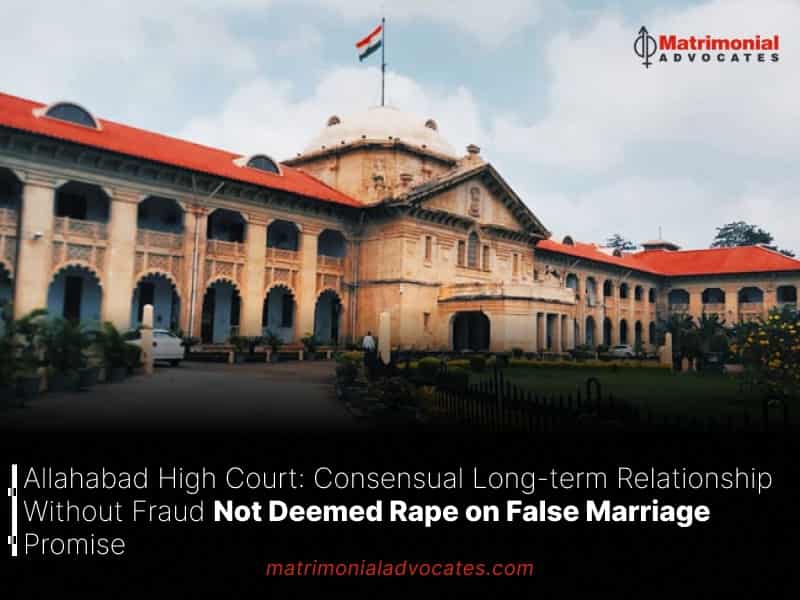
“Each promise of marriage would not be considered as a fact of misconception for the purpose of consensual sexual intercourse unless it is established that such promise of marriage was a false promise of marriage on the part of the accused since the beginning of such a relationship.”
Allahabad High Court: In an application submitted under Section 482 of the Code of Criminal Procedure, 1973, to quash the chargesheet and all criminal proceedings under Sections 376 and 386 of the Penal Code, 1860, Justice Anish Kumar Gupta dismissed the criminal case against the accused. He observed that the complainant, a mature woman with adult sons, had begun a physical relationship with the accused while still married. This raises significant questions about her legal ability to enter into a new commitment. Given her marital status, any promise of marriage made by the accused would be legally invalid, as she was not in a position to marry at that time. Furthermore, her involvement in the relationship appears to have stemmed from personal desire, complicating her claim to victimhood due to a breach of promise, as such a promise was legally non-existent at the outset of their relationship.
Background: In an application submitted under Section 482 of the Code of Criminal Procedure, 1973, to quash the chargesheet and all criminal proceedings under Sections 376 and 386 of the Penal Code, 1860, Justice Anish Kumar Gupta dismissed the criminal case against the accused. He observed that the complainant, a mature woman with adult sons, had begun a physical relationship with the accused while still married. This raises significant questions about her legal ability to enter into a new commitment. Given her marital status, any promise of marriage made by the accused would be legally invalid, as she was not in a position to marry at that time. Furthermore, her involvement in the relationship appears to have stemmed from personal desire, complicating her claim to victimhood due to a breach of promise, as such a promise was legally non-existent at the outset of their relationship.
When the informant requested that he marry her, the accused postponed, stating he would do so after his sister’s wedding. Subsequently, the informant learned that the accused had become engaged to another woman on December 31, 2017. The informant further claimed that the accused maintained a sexual relationship with her under the guise of marriage and secretly recorded a video of her. He then demanded ₹50,00,000 within 15 days, threatening to kill her sons and release the video publicly if his demands were not fulfilled.
Analysis and Decision:
The Court noted that during the investigation, Call Detail Records (CDR) were obtained, and based on these records, the Investigating Officer determined that the alleged location of the incident in the FIR did not correspond with the CDR reports for both the accused and the informant. It was also observed that the informant is a 50-year-old woman with two adult sons, aged 27 and 25, while the accused is approximately 26 years old. Following the death of the informant’s husband, her son assumed control of the family business and was responsible for paying ₹1,00,00,000 to the accused. The Court further referenced Sections 375 and 90 of the IPC, explaining that for an offence under Section 375, consent must involve the voluntary participation of the prosecutrix in the physical relationship. In such cases, consent would only be deemed invalid if it was given under a misunderstanding of facts or through fear of harm to the victim or someone whom the victim cares about.
The Court further observed that when the informant began the physical relationship with the accused, her husband was still alive. Therefore, any claim that the accused had promised to marry her was irrelevant, as the informant was not legally capable of marrying the accused at that time. Additionally, their consensual physical relationship persisted for approximately 12 to 13 years without any objections from the informant. The Court concluded that this long-term consensual adulterous relationship did not meet the definition of rape as outlined in Section 375 of the IPC.
After referencing various judgments, the Court clarified its interpretation of a promise to marry, stating that not every promise of marriage can serve as grounds for claiming a misconception of fact in cases of consensual sexual intercourse. For such a promise to be considered false, it must be demonstrated that the accused had no intention of fulfilling the promise from the outset of the relationship. Unless it is alleged that the accused engaged in deceit from the very beginning, such claims cannot be substantiated.
At the outset, a promise cannot be deemed false. A promise made in good faith that later falls apart due to changing circumstances or other issues between the parties cannot be classified as a misconception of consent for engaging in a physical relationship.
The Court further remarked that when a mature woman, fully aware of the implications of entering into a physical relationship based on a promise of marriage, willingly participates, she understands the associated risks, and there is a clear distinction between a marriage and a promise of marriage.
The Court emphasized that if the parties had a long-standing, consensual physical relationship without any deception from the beginning, such a relationship would not be considered rape.
The Court concluded that the allegation of a promise to marry, contingent on the death of the informant’s husband, was merely an excuse on her part. Even if the accused had made such a promise, it held no legal significance, as the informant, a mature woman with two adult children, had knowingly and willingly entered into the relationship.
The Court also observed that it seemed the informant had lured the accused, who was financially dependent on his family, into the relationship. This dependency resulted in the informant coercing him into the affair, which began with her clear and voluntary consent. Consequently, the relationship did not qualify as rape under Section 375 of the IPC.
The Court ruled that no rape offence was established against the accused in this case. It found that the informant had filed the FIR out of frustration after discovering the accused’s engagement to another woman and was unwilling to let him go. Thus, the allegation of forcible rape was fabricated by the informant solely to justify the filing of the FIR, and this claim was not supported by the investigation.
As a result, the Court dismissed the criminal proceedings against the accused.





